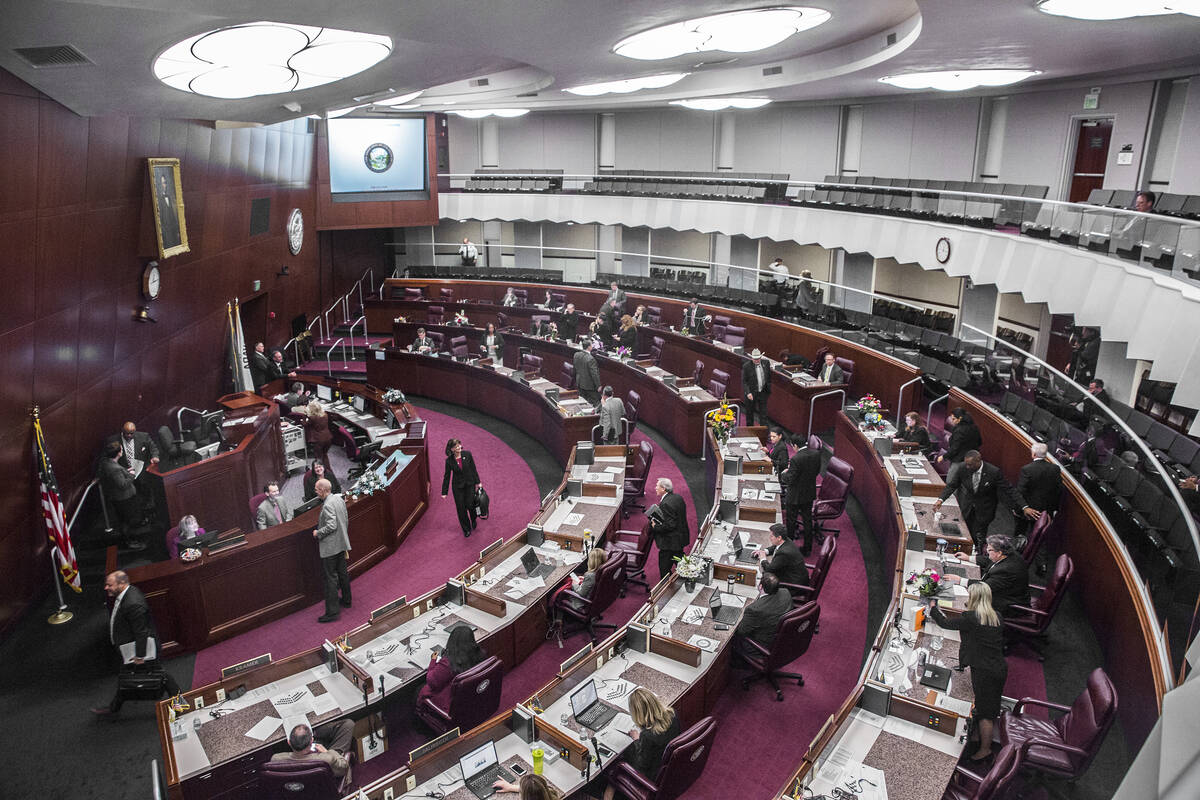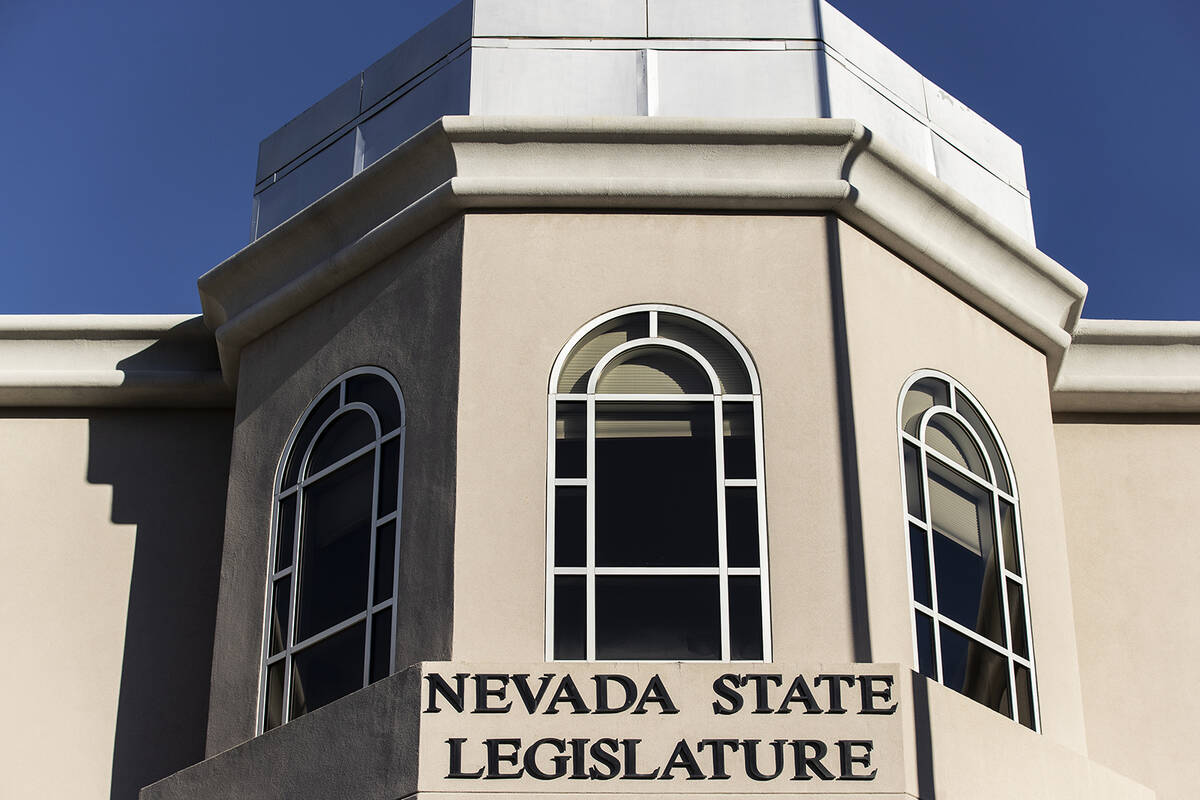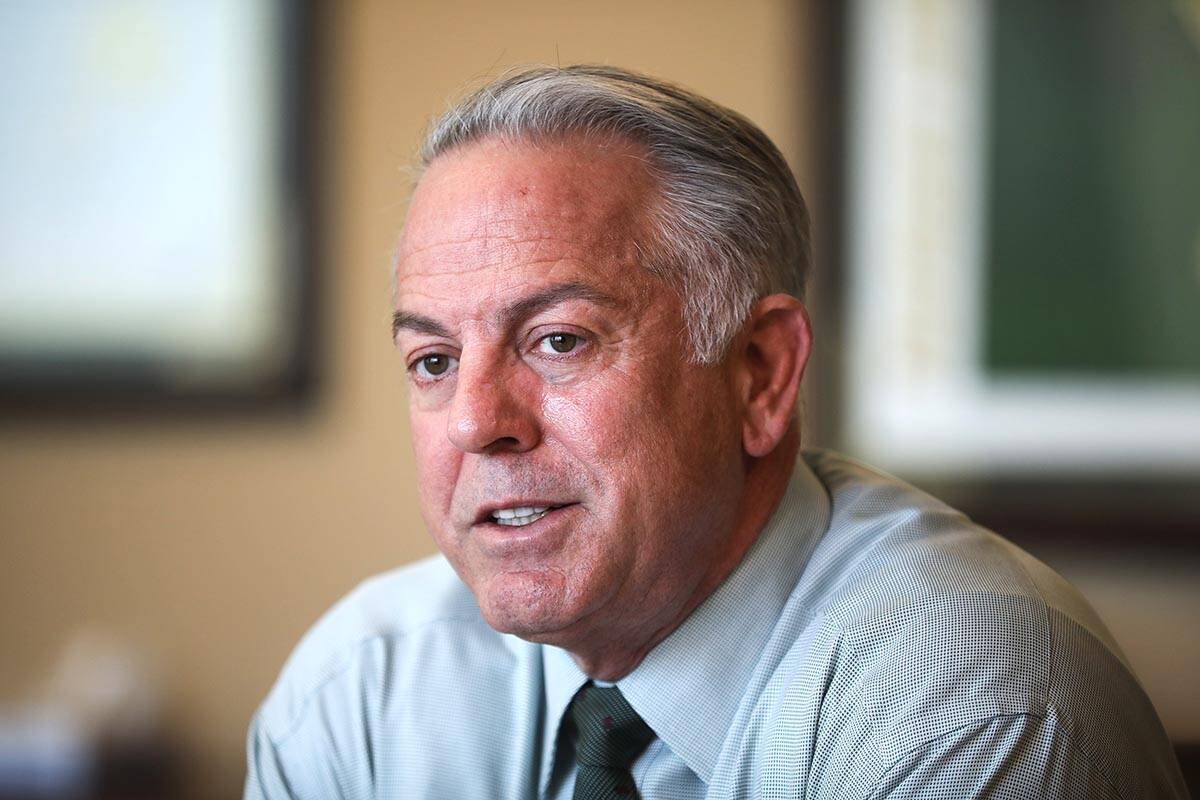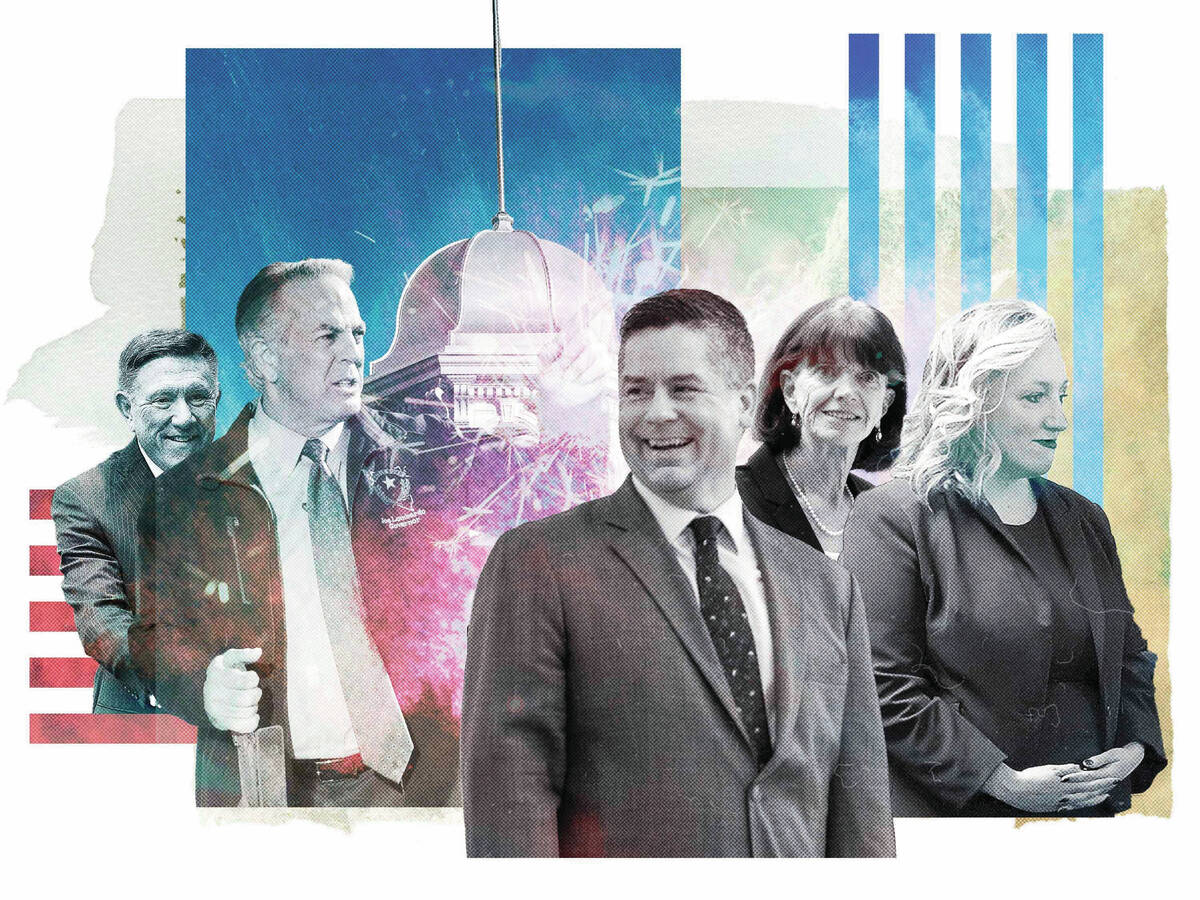What would a Democratic supermajority in the Legislature look like?
As the election that will determine whether Gov. Joe Lombardo maintains his veto power looms, Republicans worry what a Democratic-controlled Legislature would do in the next session, while Democrats pledge to keep working across the aisle regardless of the outcome in November.
If Democrats are successful in achieving supermajorities in the Assembly and Senate, they’d have enough votes to render the governor’s veto powers — and his legislative priorities — moot.
A supermajority occurs when when one party holds two-thirds of the seats in a chamber, allowing it to pass tax and revenue increases without a vote from the other side of the aisle and override a gubernatorial veto.
During the 2023 session, Democrats held a supermajority in the Assembly with 28 seats out of 42 and were just one seat away from a supermajority in the 21-member Senate. Republicans must maintain their current seat count in the Senate or pick up just one seat in the Assembly to block a Democratic supermajority.
Lombardo and state Republicans have put their full force behind protecting his veto power — an authority the governor wielded often in the last session, breaking a record with 75 vetoes.
The first-term governor vetted and hand-selected candidates in the primary, gave them his endorsement and supported them both financially and with platform positions. He thinks the party has done a robust job of selling the candidates, and now it’s up to voters to make a decision, he said.
With less than two months until the election, Nevada Republicans are worried about what an essentially one-party rule might entail, including the possibility that Democrats might start the session voting on a swath of bills Lombardo had vetoed at the end of the last session and approve a tax increase.
The Democratic speaker of the Assembly, however, said he plans to continue working with both the governor and Republicans to pass legislation through the regular legislative process, with the ability to override vetoes sitting in his back pocket.
The return of vetoed bills
Some of the 75 bills the governor vetoed will return automatically in the next session for further action, if the Legislature so chooses. It can decide to take no further action on a returned bill and keep Lombardo’s vetoes in place, or it can take up the bill and act on it, according to the Legislative Counsel Bureau.
Those vetoed bills include several housing-related policies that would apply rent control provisions, halt evictions up to 60 days for renters with pending rental assistance applications and require more transparency regarding fees in rental leases. The list also includes Assembly Bill 319, appropriating $43 million from the general fund to go to universal free breakfast and lunch in schools, and Senate Bill 419, which was intended to allow people access to Medicaid coverage regardless of their immigration status.
Lombardo anticipates Democrats would re-read those outstanding bills, and because his veto ability would be nullified, they would go through and become law.
He said his efforts to block a Democratic supermajority aren’t for his “personal power” or ability to move his vision forward in totality but to achieve a legislative make-up where “everybody can have a voice in the process.”
“We’re trying to do good government,” he said. “We’re not trying to make partisan government, and when you have single-party rule, that’s exactly what happens. Everything’s done in a vacuum. You don’t have any discussion, discourse or for the betterment of the majority versus the minority.”
Nevada Senate Republican Leader Robin Titus said unchecked power from either political party is never good, and a Democratic supermajority in both houses would negate the checks and balances of the system.
Speaker Steve Yeager, who presides over the Assembly and controls the flow of legislation, said there is a lot of fearmongering about a potential Democratic supermajority and there is “nothing in the past” to make people worry about it.
If there is interest in a particular bill that was vetoed in the last session, legislators would simply introduce a new bill and start that process over again, rather than overriding a veto at the beginning of the session, Yeager said.
The Legislature will see a high turnover in the next session, with around 35 percent of the Assembly being new members, Yeager said. Continuing with the regular legislative process would be more fair to the new members still getting their feet wet, he said.
“I would have to think really long and hard about whether we would want to try to override a veto from a bill when 35 percent of the members weren’t at the Legislature to hear the bill in committee (and) to vote on it,” Yeager said.
The speaker said he does not want to assume that because Lombardo vetoed legislation the first time around that he would veto it again. The governor explained in his veto letters why he vetoed the bills, so Yeager hopes they can address those concerns this time around and make changes to get his approval, he said.
“If there’s something in the bill that the governor just didn’t like, and we can make a change to that, I would certainly like to do that and give him a chance to sign it,” Yeager said, adding that some of the governor’s vetoes came as a surprise.
Overriding vetoes during the session “would probably be the exception and not the rule,” Yeager said. “We’re going to try to continue to work together on issues, and I think we do have a lot of things that we agree on.”
When asked if there is any situation in which he could see Democrats overriding the governor’s veto, Yeager said it is too early to tell.
“You want to continue to have conversations and try to find middle ground and compromises,” he said. “I mean, is there some scenario where we just really butt heads and we don’t agree, and we consider it? Maybe, but just a lot of intricacies there.”
Democrats’ priorities, Republicans’ worries
Nevadans can expect to see Democrats push similar legislation as the 2023 session, Yeager said. They’d work to pass bills implementing free school meals, rent control and protections for in vitro fertilization.
He also intends to bring back Assembly Bill 250, which would put in place price controls on drugs, as well as the housing legislation Lombardo vetoed, including the 10 percent rent cap for people on fixed income and the bill requiring disclosure on fees associated with rentals, Yeager said.
Senate Majority Leader Nicole Cannizzaro, D-Las Vegas, did not return requests for comment for this story, though she announced plans to put forward IVF protections.
Republicans’ biggest worries about a Democratic-controlled legislature, besides the impact one-party rule would have, are the efforts to put in place rent control policies and the potential to increase taxes.
Lombardo, who was skeptical of Yeager’s assurances, said he is concerned Democrats would push forward policies like landlord tenant policies and remove summary evictions, which he said would be burdensome for landlords and provide a crutch for individuals that were facing eviction by tying up the legal system “versus actually paying the rent.”
Under Democratic rule, Lombardo anticipates an expansion to the size of government and increased regulations, as well as an expansion of union mentality and collective bargaining.
The governor was unable to push forward some of his biggest priorities in the 2023 session — such as implementing voter ID and expanding school choice. If a Democratic supermajority were to take place, he’d have an even harder time putting forward those goals.
His priorities in the next session relate to education, such as increasing school choice opportunities, putting accountability in place and having the ability to remove bad actors and bad processes, Lombardo said. He also wants to expand economic diversification and development, and he wants to increase affordable housing through making the process to get development on federal land easier.
“I’ve been trying doggedly to push against the federal government to make it a little bit easier to process land through the BLM,” he said. “That is a benefit to all, no matter what your political affiliation is. The Democrats specifically have failed to support me in that endeavor.”
Nevada Senate Republican Leader Robin Titus expressed concerns about how the state will pay for Democrats’ wish list, as well as Nevada’s efforts to bring in more businesses without burdensome regulations.
Minority Whip Richard DeLong could see a Democratic supermajority implementing a bill that allows for higher limits on fees in medical malpractice cases, which DeLong said could exacerbate the shortage of doctors because of unaffordability of insurance.
Responding to concerns about tax increases, Yeager noted the largest tax increase in Nevada happened in 2015 with a Republican Legislature and governor.
“We hope this is obvious, but we want to be good financial stewards and want to respect taxpayer money,” Yeager said. “We’re trying to lower costs for Nevadans, not increase costs, and I think that’ll be top of mind for everybody in whatever bill we’re looking at.”
Bipartisan goals
Regardless of the outcome of the election, DeLong thinks some bipartisan progress will be made, especially when it comes to policies on water and how state engineers operate. He also hopes bipartisanship can be reached on changes to education.
Yeager wants legislators and the governor to collaborate and work together on shared priorities, passing legislation and solving problems. There are a lot of things both parties agree on, and Yeager said he is hopeful that after the election season, “we can roll up our sleeves and actually try to work together to what our constituents want, which is to solve problems for the state.”
“I think the Legislature is strengthened by that kind of collaboration, and that’s the way I intend to operate,” he said.
Organizations’ legislative goals
Progressive organizations welcome the idea of a Democratic supermajority in the Legislature and think it could make a big difference in pushing forward their agendas, while conservative groups worry what the Democrats would do.
Amber Falgout, communications director of Battle Born Progress, a progressive group that lobbies in the Legislature, said the organization’s wish list includes policies around housing, such as rental caps for seniors and summary eviction reform, as well as policies to address the cost of prescription drugs. Falgout would also like to see the return of the free school lunch bill and the bill barring guns at polling locations. She’d also like to see the introduction of a bill on age requirements for certain firearms.
“I would say that if we were able to get a veto-proof majority, that it would enable our legislators to prioritize policies that are going to directly help their constituents,” Falgout said.
Frankie Perez, a team member of Make the Road Nevada, said the group’s priority is getting the Hope Act passed in the next Legislature that would pave the way for undocumented pregnant women be able to use Medicaid. He’d also like to see revisions to the local street food vendor law regarding the zoning for vending.
Yadusha Williams, chair of the Clark County chapter of Moms for Liberty, said she’s heard Republicans hope to expand and preserve school choice and protect parental rights in schools, and her group is concerned about a Democratic supermajority hindering access to school choice. She said her group’s main focus is protecting school rights and kids’ rights, and ensuring they have an education focused on reading, writing and arithmetic.
“Our main goal is to advocate for systems where children can excel academically free from distraction and gain the skills they need to succeed,” Williams said.
Contact Jessica Hill at jehill@reviewjournal.com. Follow @jess_hillyeah on X.

























